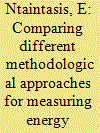| Srl | Item |
| 1 |
ID:
162946


|
|
|
|
|
| Summary/Abstract |
This paper uses and comparatively evaluates objective, subjective and composite indicators for measuring and analyzing energy poverty in Attika Region, Greece. The necessary data for the quantification of these indicators were gathered through a survey involving 451 households. The results of the analysis showed that the measurement of energy poverty based on classical objective and subjective indices leads to divergent results, which in addition have little relevance to each other. To a large extent, households characterized as energy poor by one method are not classified as such with another. The use of composite indicators adjusted to local circumstances seems to form a more coherent framework for measuring energy poverty in an area and may provide additional information as regards the intensity of energy poverty. The implementation of the two composite indicators developed in the context of this study showed that energy poverty levels in the region of Attica range between 37% and 43.5%. About 27.5% of the households are energy poor with both composite indicators, while the 11.5% of households are characterized by high energy poverty intensity. Also, the analysis of the characteristics of the energy poor households provides useful insights for developing appropriate policies to tackle the problem.
|
|
|
|
|
|
|
|
|
|
|
|
|
|
|
|
| 2 |
ID:
115628


|
|
|
|
|
| Publication |
2012.
|
| Summary/Abstract |
As energy prices continue to rise to reflect the real cost of carbon, the numbers of households in fuel poverty is increasing rapidly. This paper uses a unique data set to explore one alternative measure of fuel poverty based on whether consumers feel able to afford their energy, similar to one introduced by the government a few years ago. We explore the links between an expenditure based and our subjective measure of fuel poverty and compare these differences with those between official measures. Amongst low income households, 28% spent more than a tenth of their income on energy in the home, and so would be likely to qualify as fuel poor under the most usual definition; but only 16% felt unable to afford sufficient energy to keep their homes warm. Amongst this group who felt they had difficulty in affording sufficient energy, less than half were 'expenditure' fuel poor. The paper argues that reintroduction of a self-reported measure by the government would be a valuable aid to policy development.
|
|
|
|
|
|
|
|
|
|
|
|
|
|
|
|